Americans prioritizing gift-giving for pets over family members, survey says
FOX Business’ Jackie DeAngelis reacts to surveys reporting Americans think the ideal holiday time with family is under four hours, Americans are prioritizing pets over their family, and Americans are skeptical about keeping New Year’s resolutions.
Christmas trees, lights and other holiday decorations might make your home look festive — yet they can also pose a risk to your pets, according to the American Veterinary Medical Association.
Several veterinarians shared tips on how to protect your furry friends while decorating for the season.
Among the potential hazards are tinsel on trees, as well as ribbons and string used for wrapping packages.
RAW DIET FOR DOGS IS TAKING OVER TIKTOK, BUT WHAT DOES YOUR VETERINARIAN THINK OF THE LATEST TREND?
"Cats start playing with it, and unfortunately they eat the ribbon or tinsel and actually get an intestinal blockage," Dr. Jean Oberg, director of the veterinary technology program at Long Island University in Brookville, New York, told Fox News Digital in an interview.
"I've removed string and tinsel from pets many times over the Christmas holidays."
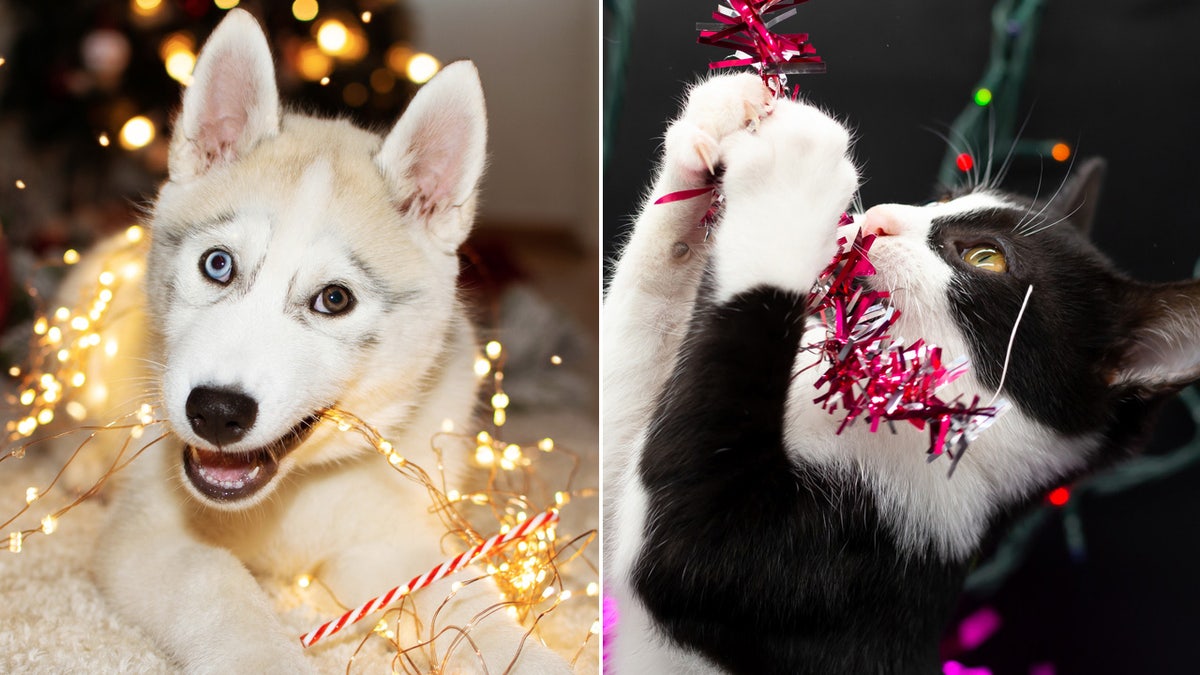
Some Christmas decorations can pose a risk to pets, according to the American Veterinary Medical Association. (iStock)
When hanging ornaments on trees, it's best to put the breakable decorations toward the top of the tree, veterinarians suggested.
Edible ornaments that are made from cookie dough and painted should also be avoided, as Oberg said some of these have high salt content and other ingredients that can be dangerous if pets consume them.
WHY THE ADOPTION OF SENIOR PETS CAN BE THE 'PURRFECT' ADDITION TO YOUR LIFE
"Some of these toxins can cause vomiting, weakness, muscle tremors and seizures," she said.
Christmas trees
Dr. Jeffrey Krasnoff, a veterinarian at Brookville Animal Hospital in Glen Head, New York, told Fox News Digital that it is important to secure Christmas trees.
"Trees should be securely placed so they can’t be knocked over, which can cause fires, broken ornaments and the ability for the tree itself to be eaten," Krasnoff said. "Pine needles can cause health issues when eaten by your pets."
The water in tree stands could pose a threat to a pet’s health, too, Krasnoff pointed out.
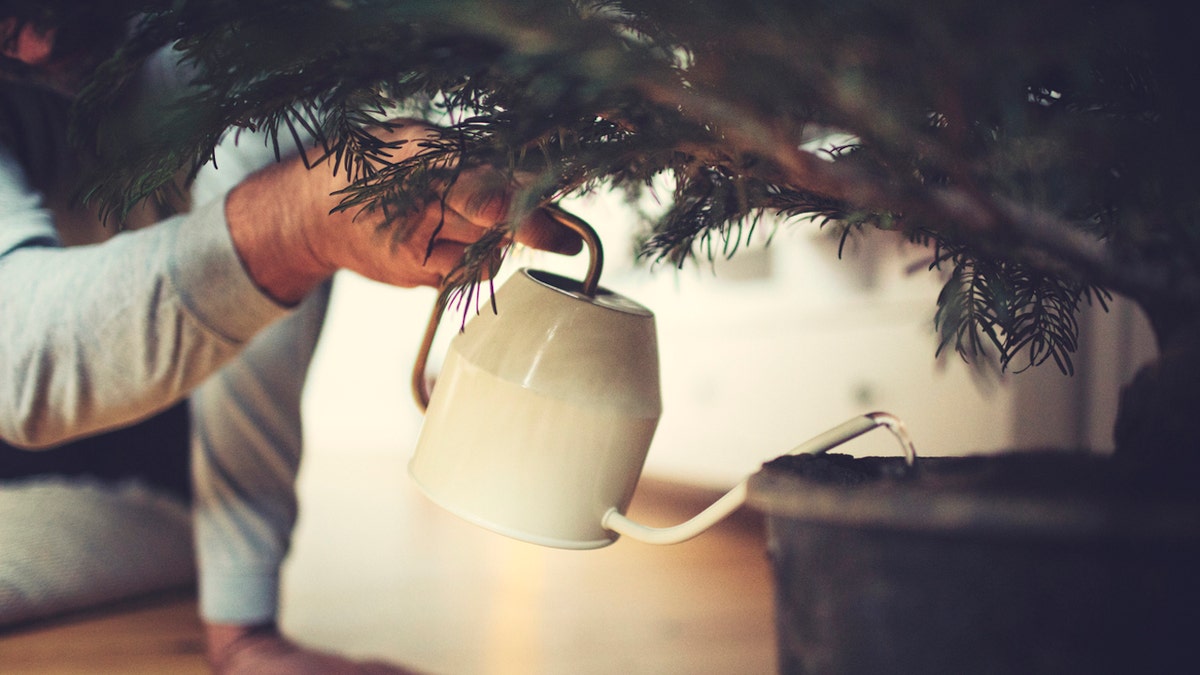
The water in tree stands could pose a threat to pets' health, said experts. (iStock)
"If your pet drinks the tree water, they can become ill," he warned. "Change the water often and keep it away from your pets."
Ideally, the tree should be placed in a room that the pets can’t access, Krasnoff said.
When stringing a tree with lights, both veterinarians said to be cautious about where the electric cords are placed — especially if you have a puppy or a pet that likes to chew, as this can lead to mouth burns.
'KELCE' BECOMES A TOP TRENDING DOG NAME IN AMERICA, PET COMPANY'S DATA SHOWS
Besides electric cords, Oberg suggested placing holiday decorations such as snow globes on shelves out of reach of pets.
"Snow globes often have ethylene glycol in the water so that it doesn't freeze with shipping," she said. "If a cat were to break them, that's a kidney toxin — it’s the same ingredient that is in antifreeze."
It is equally important to ensure that candles on menorahs or around the home are kept in secure settings.
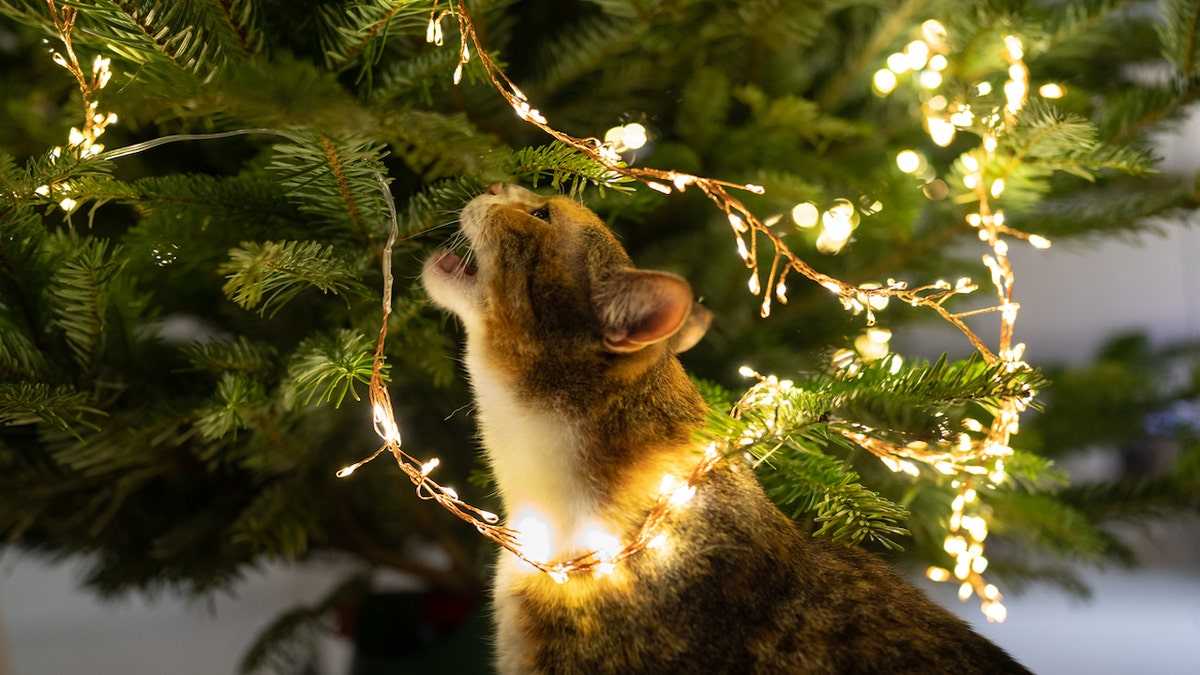
When stringing a tree with lights, veterinarians said to be cautious about where the electric cords are placed. (iStock)
"Make sure candles are out of reach of all pets to prevent fires from occurring," Krasnoff said.
Plants and greenery
When it comes to holiday plants and greenery, many plants can be toxic to pets, the expert noted.
"Toxic plants include amaryllis, azaleas, chrysanthemums, ivy, juniper and lilies," Krasnoff told Fox News Digital. "If your pet ingests any of these, it is recommended that you call your veterinarian."
BERNEDOODLE DOG RUSHED TO VETERINARY HOSPITAL AFTER SWALLOWING THREE OF HER OWNER’S SOCKS
While many people are under the impression that poinsettias are very toxic to pets, they rarely cause any clinical problems, Krasnoff added.
For pet owners who are not sure if a plant poses potential harm, the ASPCA website posts lists of toxic and non-toxic plants.
Holiday desserts
When preparing and serving holiday desserts, it's vital to keep pets away from cookies and treats, the veterinarians said.
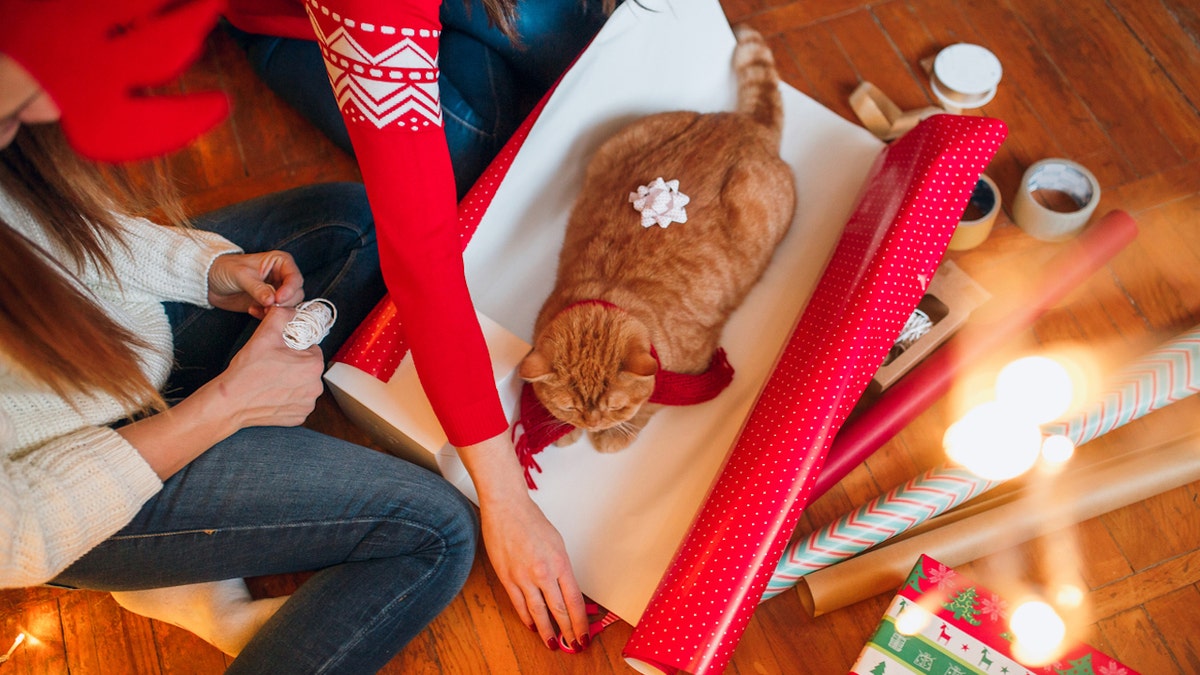
Among the potential hazards are ribbons and string used for wrapping packages, veterinarians said. (iStock)
"Most people are familiar with chocolate toxicity — the most toxic part of the chocolate is usually the baking chocolate when you're cooking," Oberg told Fox News Digital.
Other foods to avoid include macadamia nuts, raisins and grapes, as well as spices used in gingerbread cookies and cakes.
"Cloves, all spice, cinnamon and other spices at higher amounts contain ingredients that are toxic for pets," Oberg warned.
ASK A DOC: ‘DOES MY PET HAVE FALL ALLERGIES — AND IF SO, HOW CAN I HELP?’
Many products also contain the sweetener xylitol, which is typically found in sugarless gum.
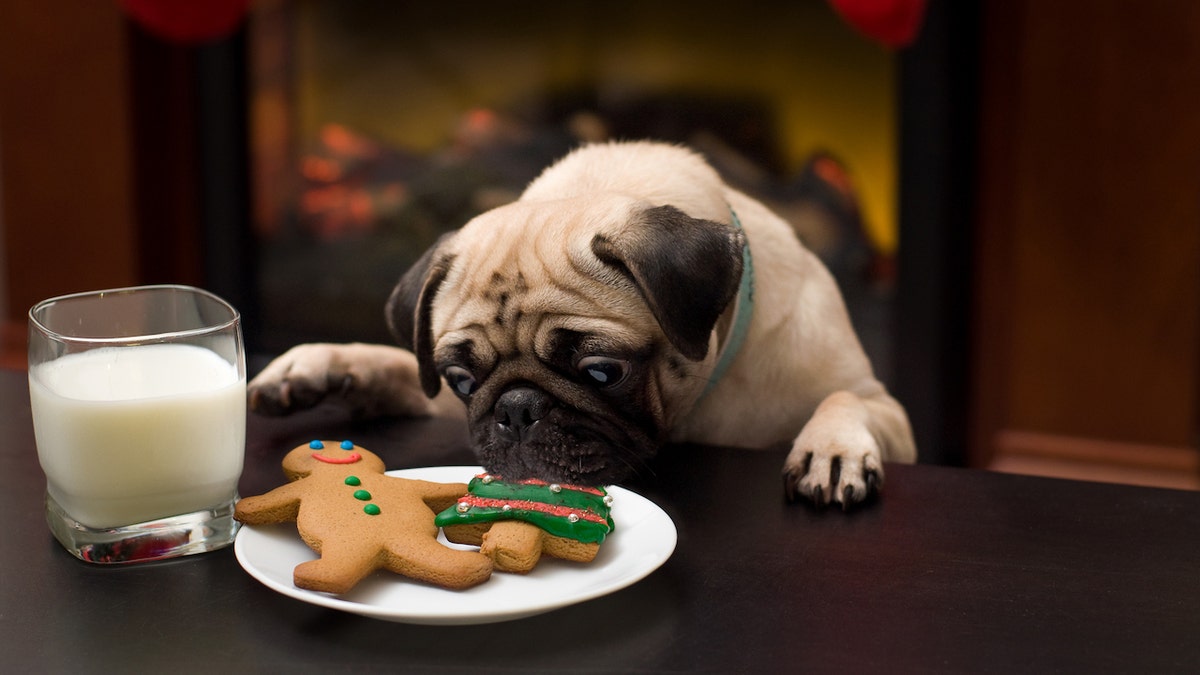
Some ingredients in holiday desserts may pose a threat to pets, said experts. (iStock)
"That is extremely toxic to pets because it causes low blood sugar," Oberg said. "One little chew of gum can kill a small Yorkie, because it can lower their blood pressure and they can have a seizure."
Table scraps
When it comes to serving holiday meals, the experts warned pet owners about feeding table scraps to animals.
"They mean no harm, but they actually do more harm by feeding the dog from the table," Oberg said, noting that visitors may not realize certain foods may be toxic to animals.
CLICK HERE TO SIGN UP FOR OUR HEALTH NEWSLETTER
Even if the food is safe, it still may cause some discomfort, she said.
The hustle and bustle of the holidays can also make pets feel stressed and overwhelmed.
"If the pet is not used to that food in their diet, they can get an upset stomach just like we can," Oberg warned.
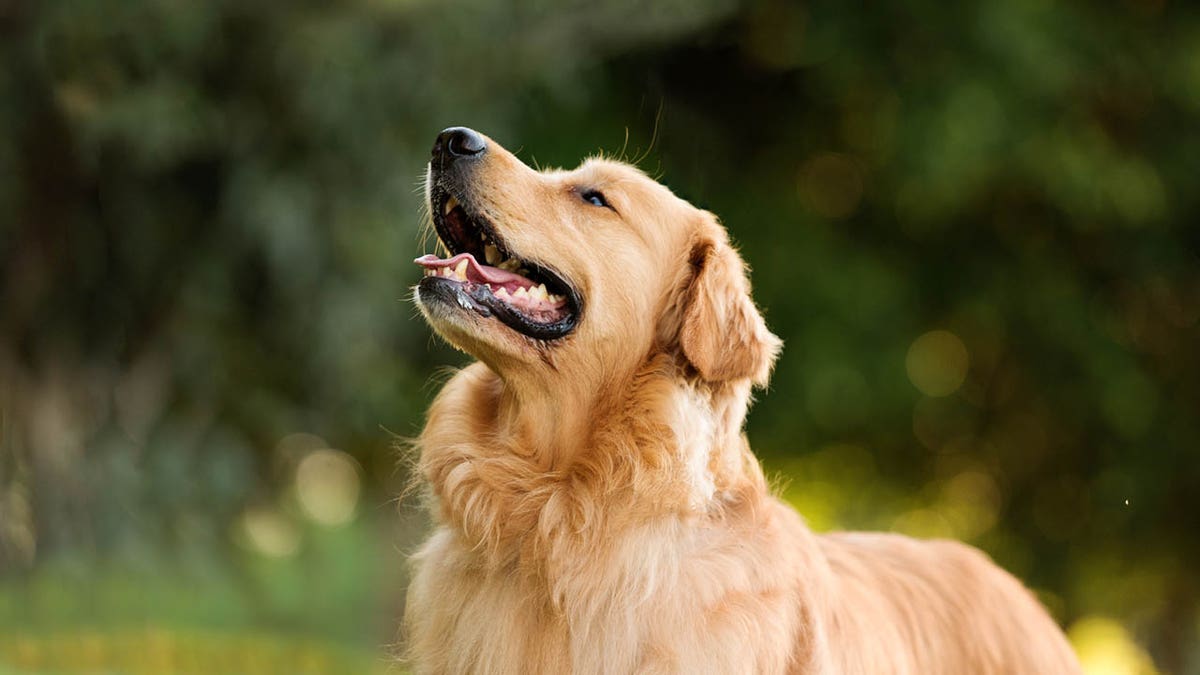
When it comes to serving holiday meals, the experts warned pet owners about feeding table scraps to animals. (iStock)
In her practice, she often sees dogs suffering from vomiting and diarrhea a couple of days after Thanksgiving or Christmas, she said.
"It’s usually due to dietary indiscretion, whether they got in the garbage pail or somebody fed them something they weren't supposed to eat."
CLICK HERE TO GET THE FOX NEWS APP
The hustle and bustle of the holidays can also make pets feel stressed and overwhelmed, Oberg said.
Before administering any medications to an animal, she suggested speaking with a veterinarian to determine the best medicine to safely lower a pet’s stress levels.









































